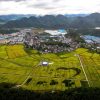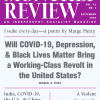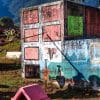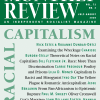
U.S.-China Trade War
In 2018, Washington launched the trade war against China. Measures included sharply increasing the customs tariffs borne by certain products imported from China, further barriers to imports from China, and sanctions against Chinese companies targeted by bans on the use of U.S.-made inputs. By June 2019, as tariff increases hit new sectors, China was no longer the United States’s largest trading partner. | more…

Toward Delinking: An Alternative Chinese Path Amid the New Cold War
During the 1960s, China was effectively excluded from the two major camps: the Soviet camp and the U.S. camp. For about a decade, China was obliged to seek development within its own borders and thereby achieved some extent of delinking: a refusal to succumb to U.S.-eurocentric globalization and an embrace of a people’s agenda of development. While foreign relations were later normalized and China once again brought in foreign capital, since being explicitly targeted as the primary rival of the United States, however, the situation may again warrant moves toward delinking and searching for alternatives, with ups and downs along the way. | more…

Tracing a Trajectory of Hope in Rural Communities in China
Zhoujiazhuang and the Puhan Rural Community offer contrasting experiences of how communities in different parts of China have responded to, negotiated, and undergone extensive changes during the last forty years since the reform policy was implemented in the country in 1979. | more…

Revisiting Collectivism and Rural Governance in China
Zhoujiazhuang is singular, being the only de facto people’s commune in China today. At present, Zhoujiazhuang still maintains the political, economic, and social structure that has been essentially in place since 1956. For over sixty years—since ten years before the Cultural Revolution and thirty-eight years after the dismantling of almost all people’s communes in 1982—Zhoujiazhuang has survived as an organizational unit over the same territory comprising the same six natural villages. | more…

Negotiating Debt
Originally set up in 1998 in China, the Puhan Rural Community was the first peasant-initiated, cross-village organization established after the collapse of the top-down people’s communes and the implementation of the household responsibility system. Puhan learned a lesson about the exploitation of usurious microfinance and decided that it was capable of establishing a system of mutual aid credit by itself, changing the cultural emphasis on money. Its story of struggling with rural financial organizations opens up a debate on the trap of marketization and monetization, the root causes of loans and debts, the negotiating power of collectives, the production mode of ecological agriculture, and the redefinition of the commonwealth. | more…

September 2020 (Volume 72, Number 4)
Climate change is just one part of a larger planetary emergency related to the crossing of planetary boundaries due to the system of capital accumulation. New diseases that can be transferred from animals to humans such as COVID-19 are another part. Knowledge of the overall planetary emergency in which the world is immersed, and its relation to capitalism, is thus crucial to our time. | more…

The Renewal of the Socialist Ideal
Any serious treatment of the renewal of socialism today must begin with capitalism’s creative destruction of the bases of all social existence. Since the late 1980s, the world has been engulfed in an epoch of catastrophe capitalism, manifested today in the convergence of (1) the planetary ecological crisis, (2) the global epidemiological crisis, and (3) the unending world economic crisis. Added to this are the main features of today’s “empire of chaos,” including the extreme system of imperialist exploitation unleashed by global commodity chains; the demise of the relatively stable liberal-democratic state with the rise of neoliberalism and neofascism; and the emergence of a new age of global hegemonic instability accompanied by increased dangers of unlimited war. | more…

COVID-19, Economic Depression, and the Black Lives Matter Protests
Crisis reveals the fault lines in society. COVID-19 is wreaking havoc on our health and killing us in large numbers, bringing with it the most massive and steep economic collapse in U.S. history. Then, there was the murder of George Floyd and the resulting astonishing global protests against racism. Anyone can see that capitalism, facing no real opposition in decades, has reverted to its default position: only profit rules us and those with money will beat down those with none, without mercy or remorse. | more…

India, COVID-19, the United States, and China
Since the emergence of COVID-19, the United States has quite openly decided to use the crisis, at a global scale, as a weapon against its perceived rival, China. In this context, India has taken a number of steps to restructure its relation to China, asserting economic stances and implementing policies that are becoming more and more closely entwined with its geopolitical positions and aspirations. | more…

A Violent Guatemala
Among ethnic disasters of the past few decades, few can match in intensity or have been reported in the media more extensively than those of the Indigenous in Guatemala. The social structure of the nationÑits hierarchy, driven by a light-skinned population, most of whom are ethnically mestizo but who do not identify with the purely IndigenousÑits history, and its small size make it an important site for the documentation and reporting of ethnic disputes and differences. | more…

I wake every day to this
A new poem by Marge Piercy. | more…

July-August 2020 (Volume 72, Number 3)
The entire United States has been upended by weeks of protests, extending to over 150 cities, sparked by the racist police murder of George Floyd. The present special issue of Monthly Review is devoted to exploring the complex interweaving of the classical Marxian critique with the rapidly developing critique of racial capitalism. | more…

Examining the Wreckage
Indigenous and African resistance and intellectual traditions provide key insights to the very nature of capitalism and how it has unfolded throughout space and time, its tentacles emanating from Europe and stretching across the globe in the forms of imperialism and colonialism. | more…